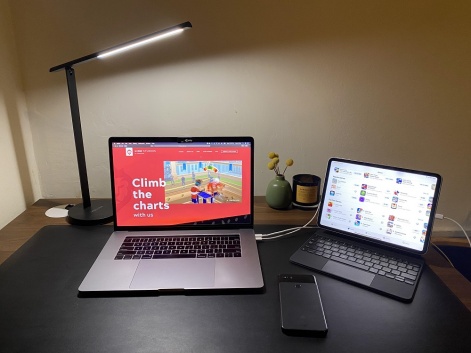The games industry plays host to a colourful cast of diverse individuals, from artists and coders to narrative designers and studio heads.
The skills to pull off these roles, however, are complex and differing, with each position requiring mastery in its field – especially in these complex times we are all living through at the minute.
To highlight some of the brilliant work that goes on behind the scenes as well as how employees around the world are adapting to the life of remote work, PocketGamer.biz is reaching out to the individuals who make up the games industry in our Jobs in Games: Remote Working series.
This week we spoke with Lion Studios director of product Amy Choi.
PocketGamer.biz: Can you tell us about your current role and what it entails?
Amy Choi: I’m a director of product at Lion Studios and I currently oversee our product management, game design, and quality assurance (QA) teams. As a product manager, I work closely with game designers, engineers, artists, and with other teams across the business to create and execute on the product roadmaps for our titles.
No matter what you end up specialising in, I recommend that aspiring game development professionals spend some time studying data analytics.Amy Choi
How did you first get into games and how did you progress into this role?
I’ve always been an avid gamer and joined a mobile ad tech company after college. After tangentially working with game developers for a few years, I wanted to delve deeper into the product side and work directly on games.
I joined Lion Studios two years ago as its first product manager and faced a steep learning curve with new tools and methodologies. I had a lot of room to experiment and grow during that first year and ramped up very quickly as a result.
What did you study (if anything) to get your role? What courses would you advise for aspiring professionals in the area?
I studied Neurobiology and French Literature in college and it’s not often I meet others in the industry with the same background. However, I find that game industry veterans come from a wide range of academic and professional backgrounds – this is one of my favourite things about working in this space.
No matter what you end up specialising in, I recommend that aspiring game development professionals spend some time studying data analytics. Most roles in game development benefit from a solid understanding of data and the ability to critically analyse different key performance indicators (KPIs).
Do you think there are any misconceptions, public or professional, surrounding your area of expertise?
Many people assume that I have a technical background as a product manager in games. You don’t need to have an engineering degree in order to do this job, all you need is a willingness to try new things and test your assumptions. You should also really love data!
What advice do you have for someone looking for a job in this profession?
Play the games! Make sure you’ve spent some time with the games created by the studio you’re interviewing with. It’ll prepare you for the questions they will inevitably ask and you’ll score some major brownie points whenever you’re able to provide specific examples from their own portfolio.
How has the shift from office to remote working impacted your role, if at all?
We’ve always worked remotely with our developers, so there wasn’t much of a change. With shelter-in-place, we've all had to become more flexible with internal timelines and working hours.
I’m cognizant of the need for flexible working hours/styles for team members with families for example and have created a community where my team is getting things done while being present for their families during this challenging time.
Ensuring you have a comfortable chair and desk, as well as a proper posture and adequate lighting can have a big payoffAmy Choi
What does your typical day look like when working remotely?
I start the day by reviewing messages I’ve received while asleep from our international partners, before checking on the health of the games I’m working on. The rest of my day is spent between meetings and things like spec reviews, A/B test analyses, and checking out new games on the charts.
What do you think are the biggest advantages and disadvantages of remote working?
The biggest advantages to working remotely are the flexibility of being able to step outside for a short walk or being able to run an errand, as well as the extra time I get to work that I’d normally spend commuting. The disadvantages are the lack of face time with my team, and not being able to work through new features and analyses in the same room.
Is there anything you wish you had known before moving to remote working?
Make time to go outside! Quite often I look up from my work and realise it’s getting dark and I’ve spent all day indoors. It’s important to find a reason to go outside for a bit each day and get some fresh air and sunshine. You’ll return to your desk refreshed and ready to roll.
Do you have any advice for others who are struggling to adjust to remote work?
Make sure you have an ergonomic setup. I’ve learned not to work for hours on the couch. Ensuring you have a comfortable chair and desk, as well as a proper posture and adequate lighting can have a big payoff - especially when we find ourselves working across completely different time zones.

After the pandemic ends and if you were given the choice, would you prefer to continue working remotely or go back to working in an office?
My ideal scenario would be a hybrid approach, where some time is spent working remotely and some time is spent working in the office. I relish having the extra time to work that I’d otherwise spend commuting but it’s important to have face-to-face time when working closely with different teams.





















